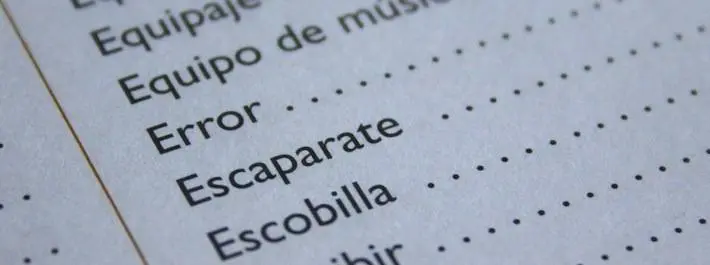The following article is archived and is no longer considered up-to-date. Please interpret its content in the context of the publishing date.

ARCHIVED
Top apps for learning a language
Read a summary using the INOMICS AI tool
In these weird times, many (though by no means all) of us find ourselves with a lot of time on our hands, stuck at home with not much to do. But actually, there are plenty of things you can get stuck into to keep you busy, and not all of them involve watching ten hours of Netflix a day. We here at INOMICS are big fans of convincing people to learn a language, because we think it's one of the best things you can do for your brain. And the modern world lends itself nicely to this undertaking: technology, downloadable directly to the smartphone, turns your social media device into a potent learning machine. There are a range of language learning apps available, many free, many with paid features, all useful in their own way. What better way to spend the coronavirus COVID-19 pandemic?

1. Duolingo
Duolingo is at the top of many language learning app lists for one good reason: it makes language learning really fun. The app is basically a game, in which you are rewarded with experience points for how much you learn. There are achievements to unlock depending on how things like how many days in a row you have learned and how many levels of a particular lesson you have completed, and for some languages you can join a weekly leaderboard which offers more rewards if you make it into the top three. You can also earn gems which you can spend on a variety of awards. Although sometimes you can learn to cheat the system and pass some aspects of lessons without learning in the most optimal way, people who really want to learn languages will take the time to read the translations and repeat lessons to make sure they're getting the most out of the app. The app gives regular daily reminders so you never forget to pick it up, and you can set your own daily goals depending on how much time you have. The forums can also be really useful, with users offering advice on language learning and grammar sheets for the many, many languages on the app. Not an English native? No problem! Many language lessons are also available in other languages - for example, German speakers can do the 'German' version of French. That being said, the English versions are by far the most comprehensive and developed. There is a paid version which offers additional features, but the free version is itself an extremely powerful learning app - you just have to deal with an advert every now and again.
2. Anki
Anki is an app specialised in flashcard learning – that is, it will display a word, phrase, or image, and you can study it and memorise it for testing later. The app schedules repetition of flashcards based on how effective you are at remembering the contents of each flashcard when tested. If you already have an understanding of the grammar and sentence structure of the language you're learning, and want help to remember large amounts of vocabulary, Anki is perfect. It has a basic user interface, but this makes it easy to use and free of distractions.
3. Memrise
Memrise is also a flashcard-based system, but it includes information on the history and culture of the language you're learning, along with multimedia like images and sounds to help you remember your content. It's designed to be fun and game-like; giving your points for repetitions and correctly remembering answers. This style is ideal for visual learners – if you remember better when presented with an image or graphic, then this could be the tool for you. It also has a more humorous tone that other apps, so it's suitable if you want something light-hearted that you can enjoy while learning. One issue to remember is that the content is user-generated, and so can be variable in quality. You may need to look carefully to find the best quality content.
4. (How to) Pronounce
A challenge for people learning a language online or with an app is making sure that their pronunciations are correct. For most practical use situations, being able to articulate your words clearly is as important as using the correct grammar and vocabulary. This is where the How To Pronounce app can help. You can type a word or phrase in English, German, French or Spanish into the app and it will read it out loud to you so that you can hear the correct pronunciation. It also includes a list of commonly misprounounced words in each language, so that you can practise difficult words before they arise in conversation.
5. Busuu
Busuu offers twelve languages including English. To get it is free, but much of the content is locked unless you pay the monthly subscription. It offers vocabulary learning and simple dialogues to read through and hear, and then you have to answer questions about them afterwards. Each lesson is themed, and each theme has a smaller travel course which can give you the essentials if you're about to travel to that country (in this climate, not likely!). There are also native speakers on the app who correct the texts you write, and on the desktop version, you can even chat to these people in your target language. In a semi-game-like experience, you collect rewards for your undertakings, which show your rank as both a language learner and teacher.
This is by no means an exhaustive list of all of the language learning apps out there. Many others exist, and there are plenty of other online courses for learning language. Check out our article on the best ways to learn a language at home for more information.
-
- Professor Job
- Posted 1 week ago
Finance: 4 Assistant, Associate or Full Professors
At IESEG School of Management in Lille, France
-
- Postdoc Job
- Posted 1 week ago
Research Associate (Post-doc, f/m) in the fields of applied econometric and distributional analysis
At LISER (Luxembourg Institute of Socio-Economic Research) in Esch-sur-Alzette, Luxembourg
-
- PhD Candidate Job
- Posted 1 week ago
3 PhD positions at the Vienna Graduate School of Economics (VGSE)
At Vienna Graduate School of Economics - VGSE in Vienna, Austria












